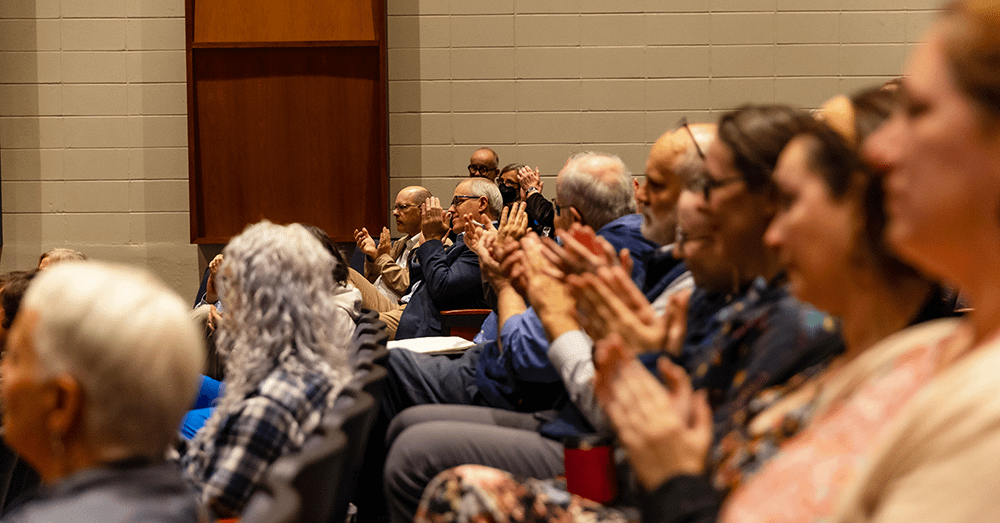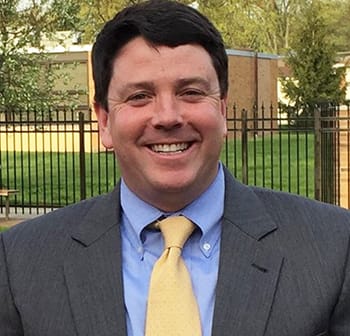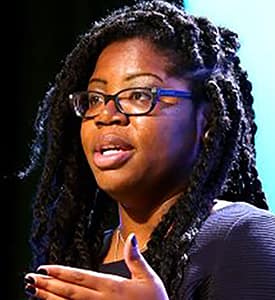MLK events stir reflection on race and privilege
In introducing author and activist Kevin Powell, featured speaker at Saint Michael’s College’s 23rd Annual Martin Luther King Jr. Convocation on January 19, Journalism Professor Traci Griffith read an eloquent passage of mature insight that Dr. King had written for his college newspaper when he was just 18 years old.
“Education must allow one to weigh evidence and sift fact from fiction, to teach one to think intensively,” were King’s words written in the late 1940s when he was a younger age than most of those filling the Chapel of Saint Michael’s the Archangel for the late-afternoon event, she said. “Intelligence is not enough. Character – that is the goal of education…Be careful, teachers!” wrote the young King, she continued.
Powell, a special invited guest on campus all day, delivered advice for faculty along the same lines at a noon luncheon when his topic was “Teaching Privilege: the Role of Academic Institutions in Preparing Leaders for Contemporary Challenges,” and later as he challenged and encouraged wider society, especially college students, during his convocation speech.
See Flickr photo gallery of MLK Convocation
Powell’s speaking style was intimate and polished, a free-form and improvised riff on themes not only of race but also class, gender, sexuality and the urgent need he perceives for practicing transformative love, hope and self-examination. It’s a program that has made Powell, who grew up in poverty in Jersey City, NJ, among the most popular of speakers nationwide in his “life’s work” to advance fearless dialogue even on topics that might make audiences uncomfortable. His topic for the main event was “Violence and the Call for Accountability and Justice in 21st Century America.”
Several times in the program student leaders of the college’s MLK Society appeared to embrace Powell’s spirited assertion that “your time is right now” — a truth that Dr. King clearly absorbed at their age to judge by the passage that Griffith read, he said. Notable were MLK Society President Tylik Williams-Prince and later, co-vice President Elias Dean, who both held the assembly in rapt attention as they spoke from the heart of their own experiences of racism, poverty, privilege and the effects of those forces on individuals and society. They spoke frankly about attitudes and experiences they’ve encountered at Saint Michael’s that they feel need to be addressed, even as they value much about their years on campus.
Williams-Prince told of coming to Vermont from his home in Brooklyn to a mostly white campus expecting to find it unfriendly and dismissive but being cautiously pleased to find most people were friendly. Yet soon, even in classes, he felt it was “easy to feel invisible,” noting that he never had a class with a faculty member of color in three years. “So we become the experts” in classes whenever race came up, “even if we’re uncomfortable,” he said. He spoke of the hurt of being repeatedly mistaken for “another tall black guy” on campus, and said he has met resistance too often when he tries to engage classmates in dialogue on such issues. “Too many see me as a threat just for existing and breathing,” he said of society’s racial attitudes in general. He spoke of the challenging and uplifting legacies of Malcolm X and Hip Hop music and attacked the “repetition” of destructive forces in neighborhoods like his that become a cyclical scourge — forces that are hard to escape without being understood and named by everybody in society. “If you’re not uncomfortable, you’re not learning,” he told fellow students, urging those present to “continue to break barriers.” He received a standing ovation from the audience.
Shortly after, Powell said the talk reminded him of his own feelings when he was a student at Rutgers University many years ago. He said students and faculty who admired Williams-Prince’s remarks as much as he did should “ask him, ‘what can you teach me?'” Powell said he personally does not like the notion of being “color-blind” since we should appreciate experiences other than our own. “We should say ‘I see you and I see your humanity. It’s not either/or, it’s both,” he said.
Elias Dean told about being just a young boy when his brother was murdered in his neighborhood “and no one seemed to notice” while his agonized family felt powerless to do anything about it. Yet they would read prominent stories in the news for days on-end when white people were killed. He described being stopped by police for no reason through his life, and shared other examples of racism he’s endured first-hand. Even on campus, he said, a hurt can come from the spirit-breaking “judgment of a professor who thinks I’m not smart enough.” In the face of large and small injustices in his life and others, “All I see is silence, then and now,” he said. “I don’t want to remain silent any more. Our silence is complicit.”
In opening remarks, Saint Michael’s President Jack Neuhauser noted that a Saint Michael’s graduate (Tom Freston ’67) was head of MTV when Powell as a young man appeared on a reality TV show on that network — a small way the College had a role in his life. The president noted the’ “long and deep” connection of the College’s founding Edmundites to King’s vision, as through Msgr. James Robinson, SSE, a prominent civil rights leader in Selma, AL, and in North Carolina and Detroit, who died recently.
Neuhauser lamented that our nation and world seem to be already forgetting important lessons that Nelson Mandela taught us, though it’s barely a year since his death. “One of the major and unique functions of a college or university is its ability to convene an informed discussion,” he said, adding that the Convocation was “a day of hope, for the task is not and will not be finished in a lifetime, and a day of love” in our knowledge of our need for others to complete the task.
Moise St. Louis, director of the Center for Multicultural Affairs and a chief organizer of the week’s events, also exhorted all to “be comfortable with being uncomfortable” as the best way to achieve better clarity. “Our capacity to see beyond our power and privilege determines the very quality of our humanity,” he said.
Music for the Convocation featured beautiful and haunting violin solos by Abbey Michelle Graham’18 and two stirringly pitch-perfect a cappella performances, of “He Wants it All” and “His Eye is on the Sparrow,” by Candace Washington ’16. Local poet Rajnii Eddins read his emotional and provocative work “For Trayvon, Mike Brown, and the Countless Unnamed” as students staged an affecting “die-in” on and around the altar area, representing those killed unjustly over race. They wore black T-shirts with the message “Who’s not here, ask why” and held posters with wisdom about our common humanity from Lincoln, Wiesel, King and others.
Themes for speaker Powell included his repeated lament that that more than a million people have been killed by guns since King was killed by one in 1968, which he called “unacceptable.” Unacceptable too is something he’s seen and talked first-hand to students across the U.S. about, namely, “a major problem with gender male violence on college campuses.” He also said he supports immigration for all as “the biggest rights issue of the 21st Century,” and noted, “we’re all immigrants.”
Sometimes, Powell said, he hears dismissive complaints from students about “feminist stuff” or “racial stuff” in classes or in the media, but he said that really, “it’s human stuff.” His problem, (as was true with Dr. King) he said, is not with the wealthy per se, but with “people who have privilege but no sense of humanity tied to that privilege.”
The entire upcoming week at Saint Michael’s Jan. 19-23 was to feature activities honoring Dr. King, including panel discussions about privilege, a film and a day-long “Teach-In,’ with faculty, covering special topics in their respective disciplines as relates to race and privilege, from political science, philosophy, psychology, sociology and Modern languages to music, business and anthropology. Wrote English Professor Lorrie Smith and Political Science Professor William Grover to their colleagues recently, “This is a crucial moment in the history of race relations in America … We believe the current moment calls particularly to white American to engage these issues.” Powell thanked Smith at the luncheon for her many years of teaching African-American literature at Saint Michael’s, including his works as an author and poet. He recalled visiting Saint Michael’s before in the late 1990s.
In both talks, Powell observed that Dr. King, for all his inspiring leadership, “didn’t do this all by himself,” and that among those advancing civil rights in important ways were so many women. He and other speakers during the day mentioned the current troubling political and social climate in the U.S. over race, saying it almost feels like we must “think about starting over.”
Powell said his own life’s primary positive influence was his mother. “I come from poverty,” he said – “welfare, food stamps and government cheese … but my mother had a vision for me that meant going to college,” even though she had a grade school education as she raised her family surrounded too frequently by violence in their Jersey City neighborhood.
The speaker at the Convocation connected with Fr. Brian Cummings, SSE, over their shared hometown — The priest gave an opening prayer at the Convocation that featured the words of St. Paul: “over all virtues, put on love’ — which was Powell’s overriding message, too, if expressed in different words:
“We gotta love, y’all, we gotta love,” he said.





